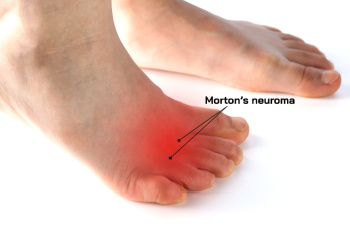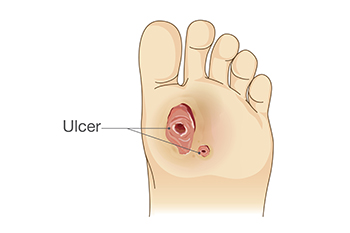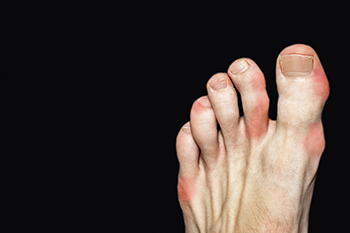Items filtered by date: September 2024
Facts About Morton’s Neuroma

Morton’s neuroma is a painful condition affecting the nerves in the ball of the foot, typically between the third and fourth toes. This condition occurs when the tissue around the nerve thickens due to irritation or pressure, often from wearing tight or high-heeled shoes. Symptoms of Morton's neuroma include sharp pain, burning, or a sensation like stepping on a small stone. Numbness or tingling in the toes can also be experienced. Risk factors include wearing narrow footwear, having foot conditions like flat feet or bunions, or engaging in high-impact sports. A podiatrist can provide custom orthotics, lifestyle modifications, or non-invasive therapies to alleviate discomfort and prevent long-term damage. If left untreated, Morton’s neuroma can lead to chronic pain and permanent nerve damage, like numbness in the toes. If you have pain in the ball of the foot that may be from Morton’s neuroma, it is suggested that you make an appointment with a podiatrist for an exam, diagnosis, and treatment options.
Morton’s neuroma is a very uncomfortable condition to live with. If you think you have Morton’s neuroma, contact Dr. Joshua David Scoll of Pennsylvania. Our doctor will attend to all of your foot care needs and answer any of your related questions.
Morton’s Neuroma
Morton's neuroma is a painful foot condition that commonly affects the areas between the second and third or third and fourth toe, although other areas of the foot are also susceptible. Morton’s neuroma is caused by an inflamed nerve in the foot that is being squeezed and aggravated by surrounding bones.
What Increases the Chances of Having Morton’s Neuroma?
- Ill-fitting high heels or shoes that add pressure to the toe or foot
- Jogging, running or any sport that involves constant impact to the foot
- Flat feet, bunions, and any other foot deformities
Morton’s neuroma is a very treatable condition. Orthotics and shoe inserts can often be used to alleviate the pain on the forefront of the feet. In more severe cases, corticosteroids can also be prescribed. In order to figure out the best treatment for your neuroma, it’s recommended to seek the care of a podiatrist who can diagnose your condition and provide different treatment options.
If you have any questions, please feel free to contact one of our offices located in Philadelphia, Bensalem, and Fairless Hills, PA . We offer the newest diagnostic and treatment technologies for all your foot care needs.
A Guide to Types of Running Shoes

Selecting the appropriate running shoe is vital for both comfort and performance. There are several types to consider. Neutral running shoes offer balanced support and cushioning for those with a neutral gait. Stability shoes provide additional support for runners who overpronate or roll their feet inward excessively. Motion control shoes are designed for severe overpronation, offering maximum support and control. Trail running shoes feature rugged soles and enhanced traction for off-road conditions. When choosing the right shoe, consider factors like your foot type, running style, and the terrain you will be covering. It is also beneficial to try on different styles, as properly fitting shoes can prevent injuries and enhance your running experience. If you have endured a foot or ankle injury while running, it is suggested that you consult a podiatrist who can offer treatment options, in addition to guiding you on the right type of shoes to wear.
You should always make sure your running shoes fit properly in order to avoid injury. For more information, contact Dr. Joshua David Scoll from Pennsylvania. Our doctor can provide the care you need to keep you pain-free and on your feet.
Choosing the Right Running Shoe for Your Foot Type
Improper shoe sizing can cause a myriad of problems for your feet. Shoes that don’t fit you properly can lead to muscular imbalances in your body, which can result in foot, knee, and hip injuries.
Tips for Finding the Right Running Shoe
- Make sure you have a thumb’s width of wiggle room between the end of your longest toe and the front of the shoe.
- There should be little to no slipping at the heel
- Don’t assume your size in one shoe brand will be your size in another
- Do not lace up your shoes too tightly
- Walk around in the store with your new shoes before you buy them
If you have any questions please feel free to contact our one of our offices located in Philadelphia, Bensalem, and Fairless Hills, PA . We offer the newest diagnostic and treatment technologies for all your foot and ankle needs.
Understanding Diabetic Foot Ulcers

Diabetic foot ulcers are sores or wounds that can develop on the feet of people with diabetes, often due to poor circulation, nerve damage, and prolonged pressure. These ulcers commonly occur on the soles of the feet and can become severe if not treated promptly. Symptoms include pain, swelling, and sometimes a foul odor if the ulcer becomes infected. Treatment for diabetic foot ulcers focuses on wound care and managing diabetes effectively. This involves cleaning the wound regularly, using specialized dressings, and offloading pressure with customized footwear or orthotic devices. In some cases, antibiotics may be needed to treat or prevent infection. For a comprehensive evaluation and tailored treatment plan, it’s suggested you make an appointment with a podiatrist. Their expertise can significantly improve outcomes and prevent serious complications from foot ulcers.
Diabetic foot care is important in preventing foot ailments such as ulcers. If you are suffering from diabetes or have any other concerns about your feet, contact Dr. Joshua David Scoll from Pennsylvania. Our doctor can provide the care you need to keep you pain-free and on your feet.
Diabetic Foot Care
Diabetes affects millions of people every year. The condition can damage blood vessels in many parts of the body, especially the feet. Because of this, taking care of your feet is essential if you have diabetes, and having a podiatrist help monitor your foot health is highly recommended.
The Importance of Caring for Your Feet
- Routinely inspect your feet for bruises or sores.
- Wear socks that fit your feet comfortably.
- Wear comfortable shoes that provide adequate support.
Patients with diabetes should have their doctor monitor their blood levels, as blood sugar levels play such a huge role in diabetic care. Monitoring these levels on a regular basis is highly advised.
It is always best to inform your healthcare professional of any concerns you may have regarding your feet, especially for diabetic patients. Early treatment and routine foot examinations are keys to maintaining proper health, especially because severe complications can arise if proper treatment is not applied.
If you have any questions please feel free to contact one of our offices located in Philadelphia, Bensalem, and Fairless Hills, PA . We offer the newest diagnostic and treatment technologies for all your foot and ankle needs.
Arthritis Can Cause Pain in the Feet and Ankles
Gout and Dietary Considerations

Gout is a form of arthritis caused by the accumulation of uric acid crystals in the joints, leading to sudden and severe pain, swelling, and redness. This condition typically affects the big toe but can impact other joints as well. Over time, frequent gout attacks can damage joints and affect overall quality of life. Certain foods can worsen gout symptoms, particularly those high in purines, which increase uric acid levels. If you have gout it is advisable to avoid consuming red meats, organ meats, and seafood such as shrimp and anchovies. Additionally, alcohol, especially beer, and sugary beverages can also contribute to higher uric acid levels. Gout can cause extreme pain and discomfort. If you have had one or more gout attacks, it is strongly suggested that you are under the care of a podiatrist who can help you manage this condition.
Gout is a foot condition that requires certain treatment and care. If you are seeking treatment, contact Dr. Joshua David Scoll from Pennsylvania. Our doctor will treat your foot and ankle needs.
What Is Gout?
Gout is a type of arthritis caused by a buildup of uric acid in the bloodstream. It often develops in the foot, especially the big toe area, although it can manifest in other parts of the body as well. Gout can make walking and standing very painful and is especially common in diabetics and the obese.
People typically get gout because of a poor diet. Genetic predisposition is also a factor. The children of parents who have had gout frequently have a chance of developing it themselves.
Gout can easily be identified by redness and inflammation of the big toe and the surrounding areas of the foot. Other symptoms include extreme fatigue, joint pain, and running high fevers. Sometimes corticosteroid drugs can be prescribed to treat gout, but the best way to combat this disease is to get more exercise and eat a better diet.
If you have any questions please feel free to contact one of our offices located in Philadelphia, Bensalem, and Fairless Hills, PA . We offer the newest diagnostic and treatment technologies for all your foot and ankle needs.

